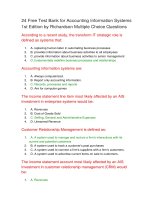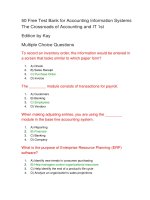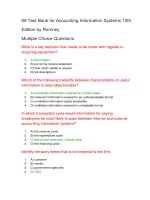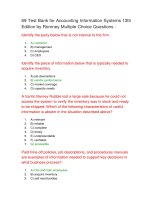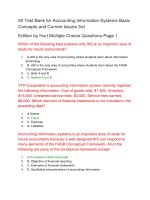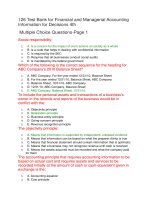84 test bank for managerial accounting for managers 3rd edition
Bạn đang xem bản rút gọn của tài liệu. Xem và tải ngay bản đầy đủ của tài liệu tại đây (121.61 KB, 21 trang )
84 Test Bank for Managerial Accounting for Managers 3rd
Edition
Multiple Choice Questions - Part 1
Each of the following would be a period cost except:
1.
A. the salary of the company president's secretary.
2.
B. the cost of a general accounting office.
3.
C. depreciation of a machine used in manufacturing.
4.
D. sales commissions.
When a decision is made among a number of alternatives, the
benefit that is lost by choosing one alternative over
another is the:
1.
A. realized cost.
2.
B. opportunity cost.
3.
C. conversion cost.
4.
D. accrued cost.
The following data pertains to activity and the cost of cleaning
and maintenance for two recent months: Production
volume is 2,000 units in month 1 and 2,500 units in month
2; cleaning and maintenance cost is $900 in month 1 and
$1,100 in month 2. The best estimate of the total month 1
variable cost for cleaning and maintenance is:
1.
A. $300
2.
B. $500
3.
C. $800
4.
D. $100
Which of the following statements regarding fixed costs is
incorrect?
1.
A. Expressing fixed costs on a per unit basis usually is the best approach for decision
making.
2.
B. Fixed costs expressed on a per unit basis will decrease with increases in activity.
3.
C. Total fixed costs are constant within the relevant range.
4.
D. Fixed costs expressed on a per unit basis will increase with decreases in activity.
In September direct labor was 40% of conversion cost. If the
manufacturing overhead for the month was $66,000 and
the direct materials cost was $20,000, the direct labor cost
was:
1.
A. $13,333
2.
B. $44,000
3.
C. $99,000
4.
D. $30,000
An example of a committed fixed cost is:
1.
A. a training program for salespersons.
2.
B. executive travel expenses.
3.
C. property taxes on the factory building.
4.
D. new product research and development.
Jumpst Corporation uses the cost formula Y = $3,600 + $0.30X
for the maintenance cost in Department B, where X is
machine-hours. The August budget is based on 20,000
hours of planned machine time. Maintenance cost
expected to be incurred during August is:
1.
A. $3,600
2.
B. $6,000
3.
C. $6,300
4.
D. $9,600
Which of the following costs would not be included as part of
manufacturing overhead?
1.
A. Insurance on sales vehicles.
2.
B. Depreciation of production equipment.
3.
C. Lubricants for production equipment.
4.
D. Direct labor overtime premium.
The salary paid to the production manager in a factory is:
1.
A. a variable cost.
2.
B. part of prime cost.
3.
C. part of conversion cost.
4.
D. both a variable cost and a prime cost.
Aberge Company's manufacturing overhead is 60% of its total
conversion costs. If direct labor is $38,000 and if direct
materials are $21,000, the manufacturing overhead is:
1.
A. $57,000
2.
B. $88,500
3.
C. $25,333
4.
D. $31,500
Manufacturing overhead consists of:
1.
A. all manufacturing costs.
2.
B. indirect materials but not indirect labor.
3.
C. all manufacturing costs, except direct materials and direct labor.
4.
D. indirect labor but not indirect materials.
At an activity level of 9,200 machine-hours in a month, Nooner
Corporation's total variable production engineering cost
is $761,300 and its total fixed production engineering cost
is $154,008. What would be the total production
engineering cost per unit, both fixed and variable, at an
activity level of 9,300 machine-hours in a month? Assume
that this level of activity is within the relevant range.
1.
A. $98.42
2.
B. $99.49
3.
C. $99.31
4.
D. $98.96
Last month, when 10,000 units of a product were manufactured,
the cost per unit was $60. At this level of activity, variable
costs are 50% of total unit costs. If 10,500 units are
manufactured next month and cost behavior patterns
remain unchanged the:
1.
A. total variable cost will remain unchanged.
2.
B. fixed costs will increase in total.
3.
C. variable cost per unit will increase.
4.
D. total cost per unit will decrease.
Which of the following would NOT be treated as a product cost
for external financial reporting purposes?
1.
A. Depreciation on a factory building.
2.
B. Salaries of factory workers.
3.
C. Indirect labor in the factory.
4.
D. Advertising expenses.
The term differential cost refers to:
1.
A. a difference in cost which results from selecting one alternative instead of another.
2.
B. the benefit forgone by selecting one alternative instead of another.
3.
C. a cost which does not involve any dollar outlay but which is relevant to the decisionmaking process.
4.
D. a cost which continues to be incurred even though there is no activity.
The term "relevant range" means the range of activity over
which:
1.
A. relevant costs are incurred.
2.
B. costs may fluctuate.
3.
C. production may vary.
4.
D. the assumptions about fixed and variable cost behavior are reasonably valid.
Conversion cost consists of which of the following?
1.
A. Manufacturing overhead cost.
2.
B. Direct materials and direct labor cost.
3.
C. Direct labor cost.
4.
D. Direct labor and manufacturing overhead cost.
Variable cost:
1.
A. increases on a per unit basis as the number of units produced increases.
2.
B. remains constant on a per unit basis as the number of units produced increases.
3.
C. remains the same in total as production increases.
4.
D. decreases on a per unit basis as the number of units produced increases.
Which of the following costs is often important in decision
making, but is omitted from conventional accounting
records?
1.
A. Fixed cost.
2.
B. Sunk cost.
3.
C. Opportunity cost.
4.
D. Indirect cost.
In describing the cost formula equation Y = a + bX, which of the
following statements is correct?
1.
A. "X" is the dependent variable.
2.
B. "a" is the fixed component.
3.
C. In the high-low method, "b" equals change in activity divided by change in costs.
4.
D. As "X" increases "Y" decreases.
Anaconda Mining Company shipped 9,000 tons of copper
concentrate for $450,000 in March and 11,000 tons for
$549,000 in April. Shipping costs for 12,000 tons to be
shipped in May would be expected to be:
1.
A. $548,780
2.
B. $549,020
3.
C. $594,000
4.
D. $598,500
The advertising costs that Pepsi incurred to air its commercials
during the Super Bowl can best be described as a:
1.
A. variable cost.
2.
B. fixed cost.
3.
C. product cost.
4.
D. prime cost.
Within the relevant range, variable cost per unit will:
1.
A. increase as the level of activity increases.
2.
B. remain constant.
3.
C. decrease as the level of activity increases.
4.
D. none of these.
The salary of the president of a manufacturing company would
be classified as which of the following?
1.
A. Product cost
2.
B. Period cost
3.
C. Manufacturing overhead
4.
D. Direct labor
Average maintenance costs are $1.50 per machine-hour at an
activity level of 8,000 machine-hours and $1.20 per
machine-hour at an activity level of 13,000 machine-hours.
Assuming that this activity is within the relevant range,
total expected maintenance cost for a budgeted activity
level of 10,000 machine-hours would be closest to:
1.
A. $16,128
2.
B. $15,000
3.
C. $13,440
4.
D. $11,433
Which one of the following costs should NOT be considered a
direct cost of serving a particular customer who orders a
customized personal computer by phone directly from the
manufacturer?
1.
A. the cost of the hard disk drive installed in the computer.
2.
B. the cost of shipping the computer to the customer.
3.
C. the cost of leasing a machine on a monthly basis that automatically tests hard disk
drives before they are installed in computers.
4.
D. the cost of packaging the computer for shipment.
Which of the following should NOT be included as part of
manufacturing overhead at a company that makes office
furniture?
1.
A. sheet steel in a file cabinet made by the company.
2.
B. manufacturing equipment depreciation.
3.
C. idle time for direct labor.
4.
D. taxes on a factory building.
Which of the following costs is an example of a period rather
than a product cost?
1.
A. Depreciation on production equipment.
2.
B. Wages of salespersons.
3.
C. Wages of production machine operators.
4.
D. Insurance on production equipment.
For a lamp manufacturing company, the cost of the insurance
on its vehicles that deliver lamps to customers is best
described as a:
1.
A. prime cost.
2.
B. manufacturing overhead cost.
3.
C. period cost.
4.
D. differential (incremental) cost of a lamp.
During the month of September, direct labor cost totaled
$11,000 and direct labor cost was 40% of prime cost. If
total manufacturing costs during September were
$73,000, the manufacturing overhead was:
1.
A. $16,500
2.
B. $27,500
3.
C. $62,000
4.
D. $45,500
Which of the following would be considered a product cost for
external financial reporting purposes?
1.
A. Cost of a warehouse used to store finished goods.
2.
B. Cost of guided public tours through the company's facilities.
3.
C. Cost of travel necessary to sell the manufactured product.
4.
D. Cost of sand spread on the factory floor to absorb oil from manufacturing machines.
Conversion costs do NOT include:
1.
A. depreciation.
2.
B. direct materials.
3.
C. indirect labor.
4.
D. indirect materials.
55 Free Test Bank for Managerial Accounting for
Managers 3rd Edition by Noreen Multiple Choice
Questions - Part 2
Buckeye Company has provided the following data for
maintenance cost: Machine hours are 12,500 in prior year
and 15,000 in current year; maintenance cost is $27,000 in
prior year and $31,000 in current year. The best estimate
of the cost formula for maintenance would be:
1.
A. $21,625 per year plus $0.625 per machine hour
2.
B. $7,000 per year plus $0.625 per machine hour
3.
C. $7,000 per year plus $1.60 per machine hour
4.
D. $27,000 per year plus $1.60 per machine hour
Slappy Corporation leases its corporate headquarters building.
This lease cost is fixed with respect to the company's
sales volume. In a recent month in which the sales
volume was 20,000 units, the lease cost was $482,000. To
the nearest whole dollar, what should be the total lease
cost at a sales volume of 16,900 units in a month?
(Assume that this sales volume is within the relevant
range.)
1.
A. $407,290
2.
B. $482,000
3.
C. $570,414
4.
D. $444,645
At an activity level of 4,400 units in a month, Goldbach
Corporation's total variable maintenance and repair cost
is $313,632 and its total fixed maintenance and repair cost
is $93,104. What would be the total maintenance and
repair cost, both fixed and variable, at an activity level of
4,600 units in a month? Assume that this level of activity
is within the relevant range.
1.
A. $420,992
2.
B. $425,224
3.
C. $415,980
4.
D. $406,736
At a sales volume of 35,000 units, Thoma Corporation's sales
commissions (a cost that is variable with respect to sales
volume) total $448,000. To the nearest whole cent, what
should be the average sales commission per unit at a
sales volume of 36,800 units? (Assume that this sales
volume is within the relevant range.)
1.
A. $13.49
2.
B. $12.17
3.
C. $12.80
4.
D. $12.49
At a sales volume of 35,000 units, Thoma Corporation's sales
commissions (a cost that is variable with respect to sales
volume) total $448,000. To the nearest whole dollar, what
should be the total sales commissions at a sales volume
of 33,200 units? (Assume that this sales volume is within
the relevant range.)
1.
A. $424,960
2.
B. $448,000
3.
C. $436,480
4.
D. $472,289
A soft drink bottler incurred the following plant utility costs:
1,800 units bottled with utility costs of $5,750, and 1,500
units bottled with utility costs of $5,200. What is the
variable cost per unit bottled (Use the High-low method.
Round to the nearest cent.)
1.
A. $3.47
2.
B. $3.19
3.
C. $1.83
4.
D. None of these is true.
The following data pertains to activity and utility costs for two
recent years: Activity level in units is 10,000 in year 2 and
6,000 in year 1; maintenance cost is $12,000 in year 2 and
$9,000 in year 1. Using the high-low method, the cost
formula for utilities is:
1.
A. $1.50 per unit
2.
B. $1.20 per unit
3.
C. $3,000 plus $3.00 per unit
4.
D. $4,500 plus $0.75 per unit
Emilio Corporation reports that at an activity level of 3,400
units, its total variable cost is $59,058 and its total fixed
cost is $101,150. What would be the total variable cost at
an activity level of 3,500 units? Assume that this level of
activity is within the relevant range.
1.
A. $59,058
2.
B. $160,208
3.
C. $60,795
4.
D. $104,125
Slappy Corporation leases its corporate headquarters building.
This lease cost is fixed with respect to the company's
sales volume. In a recent month in which the sales
volume was 20,000 units, the lease cost was $482,000. To
the nearest whole cent, what should be the average lease
cost per unit at a sales volume of 19,200 units in a month?
(Assume that this sales volume is within the relevant
range.)
1.
A. $28.52
2.
B. $24.60
3.
C. $25.10
4.
D. $24.10
Erkkila Inc. reports that at an activity level of 7,900 machinehours in a month, its total variable inspection cost is
$210,061 and its total fixed inspection cost is $191,970.
What would be the average fixed inspection cost per unit
at an activity level of 8,100 machine-hours in a month?
Assume that this level of activity is within the relevant
range.
1.
A. $50.89
2.
B. $24.30
3.
C. $23.70
4.
D. $32.96
At an activity level of 5,300 machine-hours in a month, Clyburn
Corporation's total variable maintenance cost is $114,268
and its total fixed maintenance cost is $154,336. What
would be the total variable maintenance cost at an activity
level of 5,600 machine-hours in a month? Assume that
this level of activity is within the relevant range.
1.
A. $163,072
2.
B. $268,604
3.
C. $114,268
4.
D. $120,736
At a sales volume of 27,000 units, Danielle Corporation's
property taxes (a cost that is fixed with respect to sales
volume) total $207,900. To the nearest whole cent, what
should be the average property tax per unit at a sales
volume of 27,600 units? (Assume that this sales volume is
within the relevant range.)
1.
A. $6.73
2.
B. $7.70
3.
C. $7.62
4.
D. $7.53
Erkkila Inc. reports that at an activity level of 7,900 machinehours in a month, its total variable inspection cost is
$210,061 and its total fixed inspection cost is $191,970.
What would be the total variable inspection cost at an
activity level of 8,100 machine-hours in a month? Assume
that this level of activity is within the relevant range.
1.
A. $210,061
2.
B. $196,830
3.
C. $215,379
4.
D. $402,031
Emilio Corporation reports that at an activity level of 3,400
units, its total variable cost is $59,058 and its total fixed
cost is $101,150. What would be the average fixed cost
per unit at an activity level of 3,500 units? Assume that
this level of activity is within the relevant range.
1.
A. $29.75
2.
B. $47.12
3.
C. $35.26
4.
D. $28.90
At a volume of 10,000 units, Company P incurs $30,000 in
factory overhead costs, including $10,000 in fixed costs.
Assuming that this activity is within the relevant range, if
volume increases to 12,000 units, Company P would
expect to incur total factory overhead costs of:
1.
A. $36,000
2.
B. $34,000
3.
C. $30,000
4.
D. $32,000
Given the cost formula, Y = $9,000 + $2.50X, total cost for an
activity level of 3,000 units would be:
1.
A. $9,750
2.
B. $12,000
3.
C. $16,500
4.
D. $7,500
The following data pertains to activity and maintenance costs
for two recent years: Activity level in units is 12,000 in
year 2 and 8,000 in year 1; maintenance cost is $15,000 in
year 2 and $12,000 in year 1. Using the high-low method,
the cost formula for maintenance would be:
1.
A. $1.50 per unit
2.
B. $1.25 per unit
3.
C. $3,000 plus $1.50 per unit
4.
D. $6,000 plus $0.75 per unit
Blore Corporation reports that at an activity level of 7,300 units,
its total variable cost is $511,803 and its total fixed cost is
$76,650. What would be the total cost, both fixed and
variable, at an activity level of 7,500 units? Assume that
this level of activity is within the relevant range.
1.
A. $604,575
2.
B. $602,475
3.
C. $596,514
4.
D. $588,453
At a sales volume of 27,000 units, Danielle Corporation's
property taxes (a cost that is fixed with respect to sales
volume) total $207,900. To the nearest whole dollar, what
should be the total property taxes at a sales volume of
30,900 units? (Assume that this sales volume is within the
relevant range.)
1.
A. $207,900
2.
B. $181,660
3.
C. $222,915
4.
D. $237,930A
Haar Inc. is a merchandising company. Last month the
company's cost of goods sold was $61,000. The
company's beginning merchandise inventory was $11,000
and its ending merchandise inventory was $21,000. What
was the total amount of the company's merchandise
purchases for the month?
1.
A. $61,000
2.
B. $51,000
3.
C. $71,000
4.
D. $93,000
Given the cost formula Y = $15,000 + $5X, total cost at an
activity level of 8,000 units would be:
1.
A. $23,000
2.
B. $15,000
3.
C. $55,000
4.
D. $40,000
At an activity level of 5,300 machine-hours in a month, Clyburn
Corporation's total variable maintenance cost is $114,268
and its total fixed maintenance cost is $154,336. What
would be the average fixed maintenance cost per unit at
an activity level of 5,600 machine-hours in a month?
Assume that this level of activity is within the relevant
range.
1.
A. $50.68
2.
B. $27.56
3.
C. $35.79
4.
D. $29.12
Gabruk Inc. is a merchandising company. Last month the
company's merchandise purchases totaled $88,000. The
company's beginning merchandise inventory was $15,000
and its ending merchandise inventory was $13,000. What
was the company's cost of goods sold for the month?
1.
A. $88,000
2.
B. $90,000
3.
C. $86,000
4.
D. $116,000
True False Questions
In a traditional format income statement for a merchandising
company, the cost of goods sold reports the product
costs attached to the merchandise sold during the
period.
1.
True
2.
False
A mixed cost is partially variable and partially fixed.
1.
True
2.
False
Committed fixed costs are fixed costs that are not controllable.
1.
True
2.
False
In order for a cost to be variable it must vary with either units
produced or units sold.
1.
True
2.
False
Even if operations are interrupted or cut back, committed fixed
costs remain largely unchanged in the short term because
the costs of restoring them later are likely to be far greater
than any short-run savings that might be realized.
1.
True
2.
False
Traditional format income statements are prepared primarily for
external reporting purposes.
1.
True
2.
False
All costs incurred in a merchandising firm are considered to be
period costs.
1.
True
2.
False
In any decision making situation, sunk costs are irrelevant and
should be ignored.
1.
True
2.
False
The following would typically be considered indirect costs of
manufacturing a particular Boeing 747 to be delivered to
Singapore Airlines: electricity to run production
equipment, the factory manager's salary, and the cost of
the General Electric jet engines installed on the aircraft.
1.
True
2.
False
Depreciation is always considered a product cost for external
financial reporting purposes in a manufacturing firm.
1.
True
2.
False
In a contribution format income statement, sales minus cost of
goods sold equals the gross margin.
1.
True
2.
False
Property taxes and insurance premiums paid on a factory
building are examples of manufacturing overhead.
1.
True
2.
False
Although the contribution format income statement is useful for
external reporting purposes, it has serious limitations
when used for internal purposes because it does not
distinguish between fixed and variable costs.
1.
True
2.
False
A decrease in production will ordinarily result in an increase in
fixed production costs per unit.
1.
True
2.
False
Discretionary fixed costs arise from annual decisions by
management to spend in certain fixed cost areas.
1.
True
2.
False
Automation results in a shift away from variable costs toward
more fixed costs.
1.
True
2.
False
When the level of activity increases, total variable cost will
increase.
1.
True
2.
False
Advertising costs are considered product costs for external
financial reports because they are incurred in order to
promote specific products.
1.
True
2.
False
Selling and administrative expenses are product costs under
generally accepted accounting principles.
1.
True
2.
False
The following costs should be considered by a law firm to be
indirect costs of defending a particular client in court:
rent on the law firm's offices, the law firm's receptionist's
wages, the costs of heating the law firm's offices, and the
depreciation on the personal computer in the office of the
attorney who has been assigned the client.
1.
True
2.
False
In a contribution format income statement for a merchandising
company, cost of goods sold is a variable cost that gets
included in the "Variable expenses" portion of the income
statement.
1.
True
2.
False
In external financial reports, factory utilities costs may be
included in an asset account on the balance sheet at the
end of the period.
1.
True
2.
False
Indirect costs, such as manufacturing overhead, are always
fixed costs.
1.
True
2.
False
Manufacturing overhead combined with direct materials is
known as conversion cost.
1.
True
2.
False
The following costs should be considered direct costs of
providing delivery room services to a particular mother
and her baby: the costs of drugs administered in the
operating room, the attending physician's fees, and a
portion of the liability insurance carried by the hospital to
cover the delivery room.
1.
True
2.
False
Direct material costs are generally variable costs.
1.
True
2.
False
The concept of the relevant range does not apply to fixed costs.
1.
True
2.
False
A variable cost is a cost whose cost per unit varies as the
activity level rises and falls.
1.
True
2.
False
The traditional format income statement is used as an internal
planning and decision-making tool. Its emphasis on cost
behavior aids cost-volume-profit analysis, management
performance appraisals, and budgeting.
1.
True
2.
False
